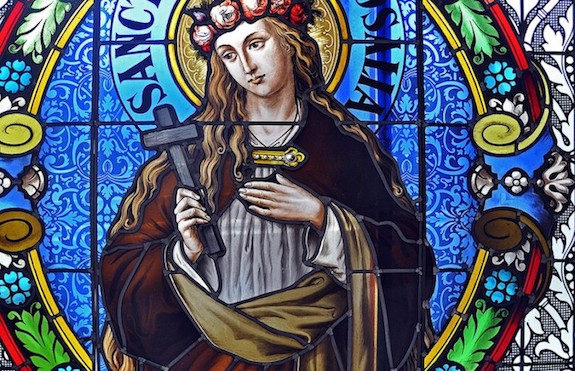
It is said that what sells newspapers is bad news. Too often preachers as well focus on all that’s bad in our world. I must confess that I have fallen into that trap myself. And candidates for political office use that device when campaigning against their opponents. We are all tired of the politics of personal destruction and would rather hear about reasonable solutions to problems rather than who is to blame for them. The real need is to have vision… to see the ways we have of making our world a better place in which to live, and to offer a positive vision of what we can do rather than simply whining and complaining about others.
Jesus lived in a troubled world, a world that in many aspects was in worse shape than the one in which we live today. Justice was, in Jesus’ time, a joke. Tyrants lorded it over everyone. Roman legions oppressed people while the Romans themselves lived in a great lie; lived in denial much as many in our world do today.
Into all of this God sent Jesus Christ to give us vision, to give us the faith, the hope, the love, and the courage to make our world become everything God dreamed it could be when He created it in the first place. Jesus resolved to accomplish that purpose one life at a time. He knew that to make the world a better place in which to live the people who comprise it must be better people. The mission of Christ was to make us responsible, and to make us personally responsible for our selves first. My first responsibility is to make something good and decent out of my life. Life, as the saying goes is God’s gift to me, what I do with my life is my gift to God.
Let me be straight with you about this: Christ makes it perfectly clear that we are responsible to unselfishly care for others. Do you remember the bible story of Cain and Able? Cain asked, “Am I my brother’s keeper?” YES, was God’s resounding answer. Christ is God’s clear response to that question. All of Christ’s teachings revolve around that point. We are to unselfishly care for others.
Our Blessed Lord begins by telling us that we are to love our neighbor as we love our selves. Therein lies the key to God’s plan to change our world. It all begins with a decent self-respect. It begins by each one of us loving ourselves enough to make something good out of ourselves. “Get a grip,” God tells us. “Take charge of yourself first, then you can know how to take care of someone else.” How you regard yourself determines how you will regard others. That is why Jesus told us to love our neighbors as we love our selves. We can’t give what we don’t have and if we don’t respect ourselves how can we respect others?
How can I expect a better world unless I first expect a better me? Society is the sum total of its individual parts. If we live in a corrupt social order we can begin the clean-up campaign by first ridding the corruption that comprises the moral failures within our own souls. How can I deal with the moral failures of others unless and until I deal with the moral failures within my own self? How can I know how to help others become better persons until I first learn how to make myself a better person?
To be sure, there is a whole lot of economic injustice, a whole lot of structural poverty, and a whole lot of systemic injustice that oppresses the underprivileged, the marginalized, the weak… that renders as insignificant the human lives that God regards to be infinitely significant. Our legal system is badly skewed, and the courts are too often infested with scheming and manipulating lawyers who are bent only on scoring wins to notch on their six-shooters, rather than giving any thought at all to notions of justice. The practice of medicine now seems to be more influenced by corporate management procedures and governmental policies rather than personal, tender loving care for the hurting. But isn’t all of that simply the sum total of the attitudes and the spiritual bankruptcy of the individuals who comprise these social systems?
Too many people are busy blaming society and the ills of society’s social structures for causing them to commit personal and individual sins. But does unlawful and immoral behavior find its causality in the social order? Isn’t it more honest to blame the corruption of the social order on the moral failures of the individuals who comprise it? The question I am raising is this: Does society cause personal sin, or does personal sin corrupt society?
It is my belief that society has no problems that cannot ultimately be traced back to the individuals who make it up. I believe that because that’s the way Jesus saw it. That is the way, and the truth, and the life He challenges us to live in so that we can change the world around us.
When I start seeing the problems that exist in others then I begin to see myself. We live in profound connectedness and in radical complicity with each other. The theological analysis of this reality is found in the doctrine of original sin, that statement of reality that directs us radically to the root cause and source of our world’s miseries.
Jesus cries out to us and tells us that a better world is within our reach… it’s within our grasp. “The reign of God is at hand,” He tells us. A better world begins when we begin to change our own personal life. “Reform your lives,” He tells us, “and believe in the Good News.”
Taking life by the yard is hard, but life taken by the inch is a cinch. Take life as it is one day at a time. Expect perfect happiness in the next life only after being reasonably happy in this life. That is the only way to deal with reality.
And so, if we want to change the world, are we willing first of all to change our own selves? How can I have the energy to change the huge systems surround us unless I at least have the energy to change myself?
The call of Jesus to twelve individuals, the call the beginning of which we just heard about in today’s Gospel account, is not a call issued simply to twelve Jewish men over 2,000 years ago. It is an insistent call, an urgent call, a demanding call that comes down to us through 2,000 years in this Church of ours… to you, to you and me here and now, to you and me today, who have been called by God to receive the Bread of Life from this altar and then to leave this church building on a mission. We are to leave here as those who are sent, sent along with the twelve apostles, to change the world by first changing our own lives.
St. Teresa of Avila once wrote: “Christ has no body on earth but ours, no hands but ours, no feet but ours. Ours are the eyes through which the compassion of Christ looks out upon the world, ours are the feet with which He goes about doing good, ours are the hands with which He blesses His people.”
For the simple truth is that when you do in fact change your life to make it more Christ-like, you will have begun to change the whole world.







